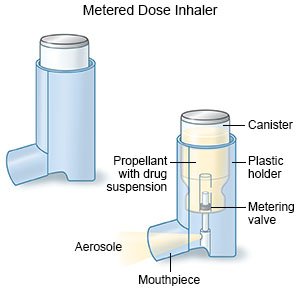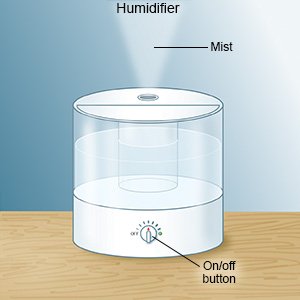Acute Bronchitis
Medically reviewed by Drugs.com. Last updated on Aug 4, 2025.
What is acute bronchitis?
Acute bronchitis is swelling and irritation in your lungs. It is usually caused by a virus and most often happens in the winter. Bronchitis may also be caused by bacteria or by a chemical irritant, such as smoke.
What are the signs and symptoms of acute bronchitis?
- Cough that lasts up to 3 weeks
- Runny or stuffy nose
- Hoarseness, sore throat
- Fever
- Feeling more tired than usual, and body aches
- Wheezing or pain when you breathe or cough
How is acute bronchitis treated?
You may need any of the following:
- Cough suppressants decrease your urge to cough.
- Decongestants help loosen mucus in your lungs and make it easier to cough up. This can help you breathe easier.
- Inhalers may be given. Your healthcare provider may give you one or more inhalers to help you breathe easier and cough less. An inhaler gives you medicine to open your airways. Ask your healthcare provider to show you how to use your inhaler correctly.

- Antiviral medicine treats infections caused by a virus.
- Antibiotics may be given if your bronchitis is caused by bacteria or if you have lung condition.
- Acetaminophen decreases pain and fever. It is available without a doctor's order. Ask how much to take and how often to take it. Follow directions. Read the labels of all other medicines you are using to see if they also contain acetaminophen, or ask your doctor or pharmacist. Acetaminophen can cause liver damage if not taken correctly.
- NSAIDs help decrease swelling and pain or fever. This medicine is available with or without a doctor's order. NSAIDs can cause stomach bleeding or kidney problems in certain people. If you take blood thinner medicine, always ask your healthcare provider if NSAIDs are safe for you. Always read the medicine label and follow directions.
Treatment options
The following list of medications are related to or used in the treatment of this condition.
Related medications
How can I manage my symptoms?
- Drink liquids as directed. You may need to drink more liquids than usual to stay hydrated. Ask how much liquid to drink each day and which liquids are best for you.
- Use a cool mist humidifier. This increases air moisture in your home. This may make it easier for you to breathe and help decrease your cough.

- Get more rest. Rest helps your body to heal. Slowly start to do more each day. Rest when you feel it is needed.
How can I help prevent acute bronchitis?
- Ask about vaccines you may need. Your healthcare provider may recommend these and other vaccines:
- Ask your healthcare provider about the flu and pneumonia vaccines. All adults should get the flu (influenza) vaccine as soon as recommended each year, usually in September or October. The pneumonia vaccine is recommended for all adults aged 50 or older to prevent pneumococcal disease, such as pneumonia. Adults aged 19 to 49 years who are at high risk for pneumococcal disease should also receive the vaccine. You may need 1 dose or 2. The number depends on the vaccine used and your risk factors.
- COVID-19 vaccines are given to adults as a shot. At least 1 dose of an updated vaccine is recommended for all adults. COVID-19 vaccines are updated throughout the year. Adults 65 or older need a second dose of updated vaccine at least 4 months after the first dose. Your healthcare provider can help you schedule all needed doses as updated vaccines become available.
- Prevent the spread of germs.
- Wash your hands often with soap and water. Carry germ-killing hand lotion or gel with you. You can use the lotion or gel to clean your hands when soap and water are not available.

- Do not touch your eyes, nose, or mouth unless you have washed your hands first.
- Always cover your mouth when you cough to prevent the spread of germs. It is best to cough into a tissue or your shirt sleeve instead of into your hand. Ask those around you to cover their mouths when they cough.
- Try to avoid people who have a cold or the flu. If you are sick, stay away from others as much as possible.
- Wash your hands often with soap and water. Carry germ-killing hand lotion or gel with you. You can use the lotion or gel to clean your hands when soap and water are not available.
- Avoid irritants in the air. Avoid chemicals, fumes, and dust. Wear a face mask if you must work around dust or fumes. Stay inside on days when air pollution levels are high. If you have allergies, stay inside when pollen counts are high. Do not use aerosol products, such as spray-on deodorant, bug spray, and hair spray.
- Do not smoke or be around others who are smoking. Nicotine and other chemicals in cigarettes and cigars can cause lung damage. Ask your healthcare provider for information if you currently smoke and need help to quit. E-cigarettes or smokeless tobacco still contain nicotine. Talk to your healthcare provider before you use these products.
 |
When should I seek immediate care?
- You cough up blood.
- Your lips or fingernails turn blue.
- You feel like you are not getting enough air when you breathe.
When should I call my doctor?
- Your symptoms do not go away or get worse, even after treatment.
- Your cough does not get better within 4 weeks.
- You have questions or concerns about your condition or care.
Care Agreement
You have the right to help plan your care. Learn about your health condition and how it may be treated. Discuss treatment options with your healthcare providers to decide what care you want to receive. You always have the right to refuse treatment. The above information is an educational aid only. It is not intended as medical advice for individual conditions or treatments. Talk to your doctor, nurse or pharmacist before following any medical regimen to see if it is safe and effective for you.© Copyright Merative 2025 Information is for End User's use only and may not be sold, redistributed or otherwise used for commercial purposes.
Learn more about Acute Bronchitis
Treatment options
Care guides
Symptoms and treatments
Medicine.com guides (external)
Further information
Always consult your healthcare provider to ensure the information displayed on this page applies to your personal circumstances.
